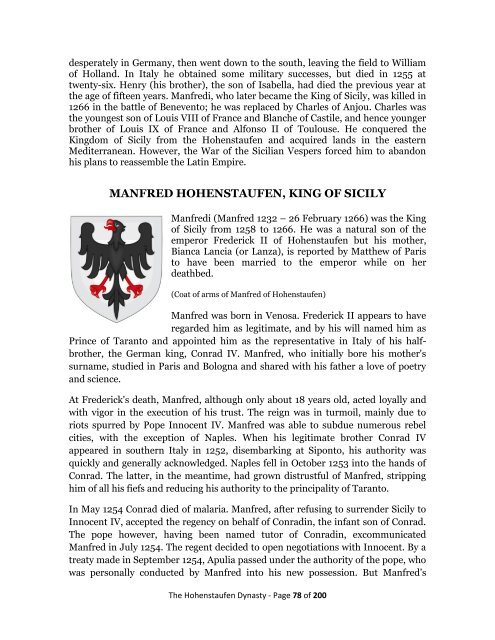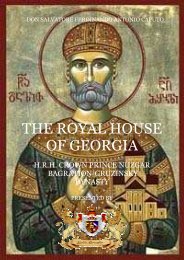here - Nobility Associations
here - Nobility Associations
here - Nobility Associations
You also want an ePaper? Increase the reach of your titles
YUMPU automatically turns print PDFs into web optimized ePapers that Google loves.
desperately in Germany, then went down to the south, leaving the field to William<br />
of Holland. In Italy he obtained some military successes, but died in 1255 at<br />
twenty-six. Henry (his brother), the son of Isabella, had died the previous year at<br />
the age of fifteen years. Manfredi, who later became the King of Sicily, was killed in<br />
1266 in the battle of Benevento; he was replaced by Charles of Anjou. Charles was<br />
the youngest son of Louis VIII of France and Blanche of Castile, and hence younger<br />
brother of Louis IX of France and Alfonso II of Toulouse. He conquered the<br />
Kingdom of Sicily from the Hohenstaufen and acquired lands in the eastern<br />
Mediterranean. However, the War of the Sicilian Vespers forced him to abandon<br />
his plans to reassemble the Latin Empire.<br />
MANFRED HOHENSTAUFEN, KING OF SICILY<br />
Manfredi (Manfred 1232 – 26 February 1266) was the King<br />
of Sicily from 1258 to 1266. He was a natural son of the<br />
emperor Frederick II of Hohenstaufen but his mother,<br />
Bianca Lancia (or Lanza), is reported by Matthew of Paris<br />
to have been married to the emperor while on her<br />
deathbed.<br />
(Coat of arms of Manfred of Hohenstaufen)<br />
Manfred was born in Venosa. Frederick II appears to have<br />
regarded him as legitimate, and by his will named him as<br />
Prince of Taranto and appointed him as the representative in Italy of his halfbrother,<br />
the German king, Conrad IV. Manfred, who initially bore his mother's<br />
surname, studied in Paris and Bologna and shared with his father a love of poetry<br />
and science.<br />
At Frederick's death, Manfred, although only about 18 years old, acted loyally and<br />
with vigor in the execution of his trust. The reign was in turmoil, mainly due to<br />
riots spurred by Pope Innocent IV. Manfred was able to subdue numerous rebel<br />
cities, with the exception of Naples. When his legitimate brother Conrad IV<br />
appeared in southern Italy in 1252, disembarking at Siponto, his authority was<br />
quickly and generally acknowledged. Naples fell in October 1253 into the hands of<br />
Conrad. The latter, in the meantime, had grown distrustful of Manfred, stripping<br />
him of all his fiefs and reducing his authority to the principality of Taranto.<br />
In May 1254 Conrad died of malaria. Manfred, after refusing to surrender Sicily to<br />
Innocent IV, accepted the regency on behalf of Conradin, the infant son of Conrad.<br />
The pope however, having been named tutor of Conradin, excommunicated<br />
Manfred in July 1254. The regent decided to open negotiations with Innocent. By a<br />
treaty made in September 1254, Apulia passed under the authority of the pope, who<br />
was personally conducted by Manfred into his new possession. But Manfred’s<br />
The Hohenstaufen Dynasty - Page 78 of 200



